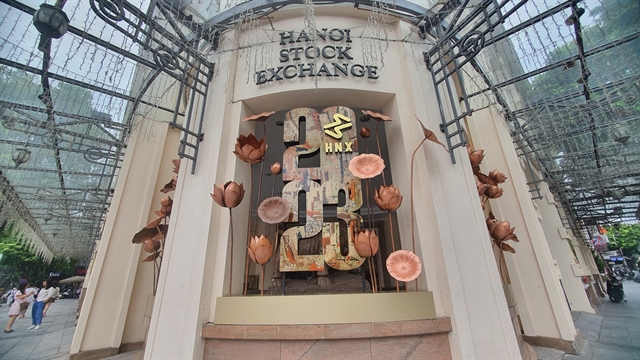The market appears to have reacted early to positive news given more supportive fiscal and monetary policies, said experts.

The Vietnamese stock market had its first weekly decline in five last week, squeezed by strong selling pressure as investors took profits at levels near the strong resistance zone of 1,140 points.
However, the market appears to have reacted early to positive news given more supportive fiscal and monetary policies, said experts.
Last week, the VN-Index on the Ho Chi Minh Stock Exchange (HoSE) lost 0.8 per cent to end June and the second quarter at 1,120.18 points. Nevertheless, the index still rose strongly by 4.19 per cent month-on-month in June and 5.22 per cent in the second quarter, with the improvement in liquidity.
The northern benchmark HNX-Index on the Ha Noi Stock Exchange (HNX) also dipped 1.8 per cent last week.
Saigon - Hanoi Securities JSC (SHS) said that a correction is needed when the VN-Index surpasses the resistance level of 1,120 points, thereby continuing to help accumulate more internal strength before it is able to completely cross the resistance zone.
Last week, the liquidity on HoSE increased slightly by 0.8 per cent to more than VND82.8 trillion (US$3.5 billion), with a decrease of 1.2 per cent in trading volume. This showed a strong divergence and short-term profit-taking pressure in speculative, small-mid cap stocks.
On HNX, liquidity decreased by 16.07 per cent to VND8.2 trillion.
Foreign investors reduced the proportion of transactions. They net sold for the second week on HoSE at a value of VND340.53 billion, but net bought VND161.79 billion on HNX last week.
Official data released on Thursday by the General Statistics Office (GSO) showed that the country's GDP grew 4.41 per cent on-year in the second quarter, just better than the growth rate of the second quarter of 2020 during the period 2011-23.
For the first half of the year, GDP growth was 3.72 per cent, lower than expectations.
Bao Viet Securities Company (BVSC) believes that more supportive fiscal and monetary policies will be issued in the coming months to continue promoting growth in the last two quarters of 2023, assuming there are no more risks of inflation and the exchange rate is stable.
According to SHS, the recently released GDP data shows that the growth momentum is faltering, with declining exports and low credit growth.
While the Government has already carried out solutions including promoting public investment and removing difficulties for the corporate bond and real estate markets, it may take time for the measures to take effect.
"In general, the stock market will react early, so it is understandable to see a shift to the positive," said SHS.
In its current state, the market benchmark is likely to rebound again soon towards stronger resistance zone of around 1,150 points.
Tran Xuan Bach, an analyst and market strategist of BVSC, said that in the medium-term uptrend, the market needs some short corrections to help accumulated stocks create new and attractive price bases and digest negative factors on the second quarter's profit outlook.
Despite many ups and downs, the stock indexes still edged higher in the first half of this year, which is quite similar to the global stock market's trend. — VNS





